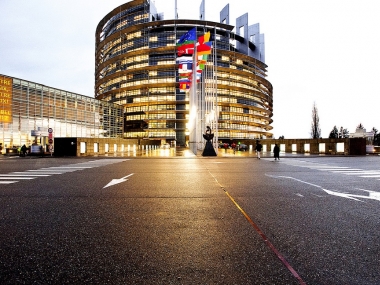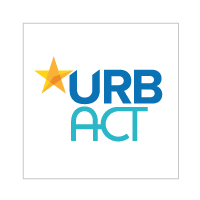URBACT contributes to European Parliament reflections on urban affairs and the new Cohesion Policy
Edited on
03 July 2019Cities from Spain and Poland testified to the Urban Intergroup of the European Parliament on the programme’s impact while the managing authority launched some elements for reflection for the future.

URBACT was invited to a hearing with the European Parliament’s Urban Intergroup, presided by Mr Jan Olbrycht, MEP, on 10 January 2018.
Two city representatives gave a passionate account of their reasons for getting involved in URBACT and the benefits it has brought to their cities – backed up with clear evidence of change.
Albert Garcia, head of EU and international department of Mollet del Vallès (Spain), made clear that as a city with 52,000 inhabitants situated 15km from Barcelona, it wasn’t always easy to forge their own identity. Precipitated by the economic crisis of 2007, the city decided not just to submit to drastic budget cuts, but to try and take the offensive to maintain a good level of public services. “URBACT is like a breath of fresh air”, he stated, “it gives you the time to step back and look at how you are spending your budget, see what other cities are doing and how you can you things differently. It brings new ideas.” Inspired by the diet policy set up by the city of Södertälje (Sweden), Mollet took the initiative to use the food purchasing for public canteens as a tool to reach environmental and health goals, adapting inhabitants’ diets to a more sustainable production model. This led to a change in their public procurement model, in 2014, and the approval of a local diet policy in 2015. As emphasized by Albert, there was no need for big investments as a result of the project, but a change in how the existing funds were spent for better impact. Now these two cities are united by a love of good food.
The Polish city of Wroclaw, represented by deputy Mayor Magdalena Piasecka, has undergone significant changes in the last 60 years, from its post-war reconstruction, to the fall of communism, to its entry into the European Union in 2004. Since then, the city has focused urban policy on reducing unemployment from a high of 12% in the 90s to less than 3% today. Like Mollet, the city uses the URBACT programme to help find responses to the current challenges facing the city. In its transition to a ‘wisdom-based economy’ it seeks to reintroduce values to the technology-led ‘smart city’ and ensure a participatory approach to policy making. Through the BoostInno network, the city is developing a new ecosystem for stimulating social innovation. The local support group, at the interface of economic and social policy, ensures a joined-up approach. For Magdalena, the shift comes in the role of the city as a broker. “The city is a motivator for its inhabitants to be more active in its creation, the decisions don’t come only from the authorities but are conceived jointly.” Here you can see how Wroclaw developed and tested a model of social dialogue consisting of active involvement of young people in the co-creation of public space thanks to URBACT.
The URBACT method is based around this integrated and participatory approach to policymaking, as was described by Head of Secretariat, Emmanuel Moulin. Building the capacities of cities to engage in this kind of policymaking, with expertise support, tools and methodologies, is the basis of the programme. Taking the knowledge and experience from cities on the ground, clustering and making it available to the wider urban community is the vital next step, ensuring close links to urban policymakers on national and EU level. Thematic knowledge clusters, tackling issues such as the vitality of small and medium sized cities, or tackling urban poverty, provide a platform for widening the learning opportunities for other cities.
Shot during the URBACT City Festival in Tallinn (Estonia) in October 2017, this video introduces URBACT and its most recent developments, notably with the focus on Good practices and transfer of Good Practices.
Nuala Morgan, head of the Communication and Capitalisation Unit of the URBACT Secretariat, zoomed in on one particular offer for cities: the URBACT Good Practices and Transfer Networks. As a result of a call for good urban practices in 2017, a total of 97 were labelled as ‘URBACT Good Practices’ and made available in a dedicated website. From this pool, the Good Practice cities could propose a ‘Transfer Network’ to be financed by the programme. This network would look in detail at the key factors surrounding the Good Practice and proceed to its adaptation and reuse in other European cities. The call closed on 10 January, with 44 applications submitted.
Finally, Eric Briat of the CGET, Managing Authority of the URBACT programme, outlined current thinking for how the programme could evolve to meet the needs of cities, within the context described in the Seventh Cohesion Report. The report highlights the importance of integrated and place-based approaches to foster economic, social and territorial cohesion along with the need to build good governance and trust in local authorities. Based on the feedback from cities such as Wroclaw and Mollet, local administrations need to continue improving their capacity to develop and implement integrated and participatory urban strategies and actions. Whether this continues in the form of longer-term transnational networks or by adding short term collaborative activities is one of the questions to be tackled by the programme’s monitoring committee. The link between this urban knowledge coming from the ground and the support to multi-level urban policymaking, at national and EU level, is the second aspect to be explored during a meeting on 6 March with the programme’s Monitoring Committee.
Jan Olbrycht commented that the role of cities in implementing Cohesion Policy was crucial. Objectives fixed at EU level need to be delivered, and cities need to be integrated into the delivery process. He found it noteworthy that, of the five scenarios identified by the European Commission for the 2021-2028 budget, only one forecast maintaining the current levels of cohesion policy funding, and only this scenario referenced urban issues.
The members of the Urban Intergroup as mayors or former mayors were particularly interested in having concrete proposals on how a well-organised transfer of urban know-how can be put forward for the upcoming regulatory discussions.
 Submitted by URBACT on
Submitted by URBACT on




